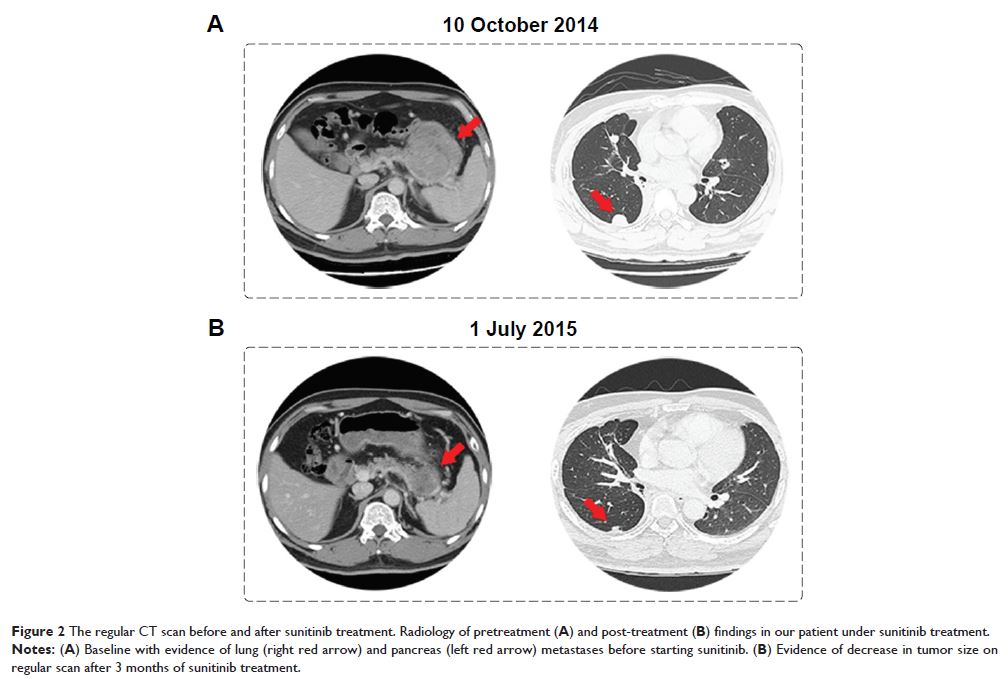108985
论文已发表
注册即可获取德孚的最新动态
IF 收录期刊
- 3.4 Breast Cancer (Dove Med Press)
- 3.2 Clin Epidemiol
- 2.6 Cancer Manag Res
- 2.9 Infect Drug Resist
- 3.7 Clin Interv Aging
- 5.1 Drug Des Dev Ther
- 3.1 Int J Chronic Obstr
- 6.6 Int J Nanomed
- 2.6 Int J Women's Health
- 2.9 Neuropsych Dis Treat
- 2.8 OncoTargets Ther
- 2.0 Patient Prefer Adher
- 2.2 Ther Clin Risk Manag
- 2.5 J Pain Res
- 3.0 Diabet Metab Synd Ob
- 3.2 Psychol Res Behav Ma
- 3.4 Nat Sci Sleep
- 1.8 Pharmgenomics Pers Med
- 2.0 Risk Manag Healthc Policy
- 4.1 J Inflamm Res
- 2.0 Int J Gen Med
- 3.4 J Hepatocell Carcinoma
- 3.0 J Asthma Allergy
- 2.2 Clin Cosmet Investig Dermatol
- 2.4 J Multidiscip Healthc

在使用伊马替尼治疗晚期隆突性皮肤纤维肉瘤无效后采用舒尼替尼治疗的有益结果
Authors Xiao W, Que Y, Peng RQ, Ding Y, Zhao JJ, Wen XZ, Weng DS, Zhang XS, Guan YX, Zhang X
Received 29 August 2017
Accepted for publication 9 March 2018
Published 1 May 2018 Volume 2018:11 Pages 2439—2443
DOI https://doi.org/10.2147/OTT.S150235
Checked for plagiarism Yes
Review by Single-blind
Peer reviewers approved by Dr Cristina Weinberg
Peer reviewer comments 3
Editor who approved publication: Dr Ingrid Espinoza
Abstract: While
traditional cytotoxic agents play a limited role in advanced
dermatofibrosarcoma protuberans (DFSP), the treatment of sunitinib for patients
with advanced DFSP after imatinib failure is not well defined. The objective of
this case report was to analyze the relationship between molecular mechanisms
and clinical outcomes of sunitinib treatment in patients with advanced DFSP
after imatinib failure. In this case report, a 37-year-old man suffered from
advanced DFSP progression after surgical operation, microwave ablation, and
chemotherapy. The immunohistochemistry in this patient revealed abundant
expression of platelet-derived growth factor receptor-beta on tumor cells, which
is one of the drug targets of sunitinib. The nucleotide sequence analysis
revealed COL1A1-PDGFB fusion transcripts in this patient. Thus, we treated the
patient with sunitinib, a multi-targeted tyrosine kinase inhibitor, after
imatinib failure. After treatment with sunitinib, the patient exhibited a
partial response and 9 months’ progression-free survival without significant
adverse drug effects. In our case, the patient with advanced DFSP experienced a
favorable outcome in 9-months’ progression-free survival and a significant
improvement of quality of life without serious side effects after sunitinib
treatment. Therefore, sunitinib could serve as another treatment option for
patients with advanced DFSP.
Keywords: COL1A1-PDGFB fusion gene, dermatofibrosarcoma protuberans,
platelet-derived growth factor receptor-beta, sunitinib
